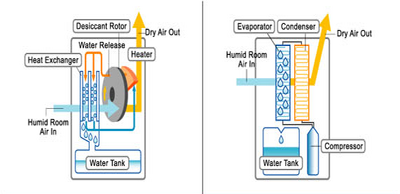
A Guide to Compressor and Desiccant Dehumidifiers
One of the most commonly asked questions we receive on a daily basis is: 'What is the difference between a compressor dehumidifier and a desiccant dehumidifier?' This blog should help you make the right choice between a compressor or desiccant unit.
How Compressor Dehumidifiers Work
A compressor dehumidifier is basically like a mini fridge and works by drawing in the air from the room, which passes over a filter and then over cold coils (much like those on a refrigerator).
As the coils cool, the water condenses and drips into the water bucket within the unit. The air is then reheated to room temperature and blown back out of the dehumidifier.
A compressor dehumidifier can run in temperatures ranging from 5-30°C. with optimum performance above 20°C. They work well in warm conditions but are much less effective in cool conditions.
In the right conditions, you can expect a 20 litre compressor unit to extract up to 5 litres in a normal domestic environment due to the lower temperature.
These are just some of our best-selling compressor dehumidifiers:
- BROLIN BR10C 10 Litre Dehumidifier
- BROLIN BR20C 20 Litre Dehumidifier
- Igenix IG9851 50 Litre Dehumidifier
Benefits of a Desiccant Dehumidifier
Desiccant dehumidifiers tend to be smaller, lighter and can be quieter than compressor units.
Whilst compressor dehumidifiers only work well in warmer temperatures (over 20°C), desiccant units extract the same amount of moisture in any temperature between 1-20°C. Desiccant units are incredibly durable and extremely effective at extracting moisture in almost any circumstances.
Although a desiccant unit may consume more power on an hourly basis than a compressor unit, they are much more effective at extracting moisture (especially at the temperatures we experience in the UK) and achieve a better result in a much shorter time.
For example, at a normal room temperature of 21°C, a 7 litre per day extraction desiccant (power consumption 660 watts per hour) will extract more moisture in one hour than a 20 litre per day extraction compressor driven unit (power consumption 370 watts per hour) will extract in one and a half hours.
At an average domestic price of 10p per kilowatt hour, the desiccant unit costs 6.6p to achieve the same result as the compressor unit which costs 5.6p. However, in cooler temperatures the compressor unit will take longer and therefore cost more to achieve the overall same result.
How Desiccant Dehumidifiers Work
Desiccant dehumidifiers use a desiccant material, typically Zeolite, which absorbs water vapour from the air in a similar way to silica gel. A fan draws air into the dehumidifier and passes it through a section of a slowly rotating wheel which holds desiccant and dries the air.
The moisture is extracted from the desiccant by heating a portion of the wheel not being used to dry the air. All desiccant units are rated in test conditions of 60% humidity (as opposed to 80% for compressor units).
They extract the same amount of moisture irrespective of the temperature in which they are working. There are no consumables on a desiccant unit; the desiccant material does not expire and does not need to be replaced or topped up.
The lifespan of a desiccant unit tends to be longer than a compressor unit as it is a far simpler process with far less moving parts, no compressor and no refrigerant gas being held under high pressure to potentially fail.
These are some of our best-selling desiccant dehumidifiers:
- BROLIN BR10D 10 Litre Dehumidifier
- Eco Air DD1 Simple 7 Litre Dehumidifier
- BROLIN QT8 8 Litre Dehumidifier
Desiccant dehumidifiers are ideal for a wide range of domestic, leisure and commercial applications including:
- Mould/damp prevention at home
- Laundry/clothes drying
- Cellar drying
- Document storage/archiving
- Car/vehicle storage
- Use on boats
- Use in caravans and motorhomes
Our expert team are on hand to answer any of your questions!
At Sunbelt, we offer a wide range of dehumidifiers and our experts can advise on the best models to suit your needs. Please contact us today for further advice.

